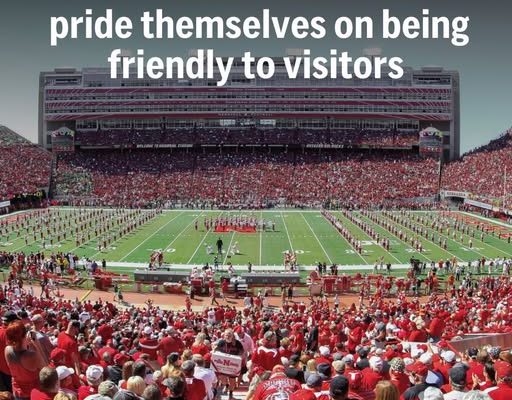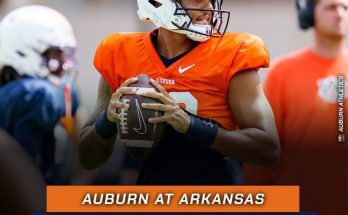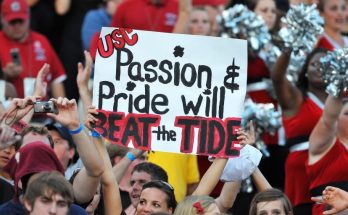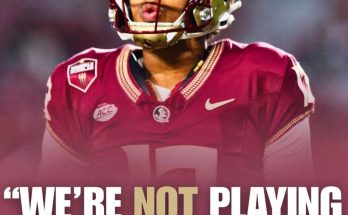In the modern era of sports, where passion can quickly cross the line into hostility, the behavior of fans often makes as many headlines as the athletes themselves. From violent brawls in European soccer stadiums to online trolling campaigns targeting athletes and referees, the darker side of fandom is no secret. The age of social media has amplified both devotion and division, giving rise to an atmosphere where taunts, boos, and hateful comments are commonplace. Yet amid this growing toxicity, one fanbase continues to stand as a shining example of what true sportsmanship and class look like: the fans of Nebraska football.
For decades, Nebraska’s supporters have earned a reputation that stretches far beyond the borders of the Cornhusker State. Known affectionately as the “Sea of Red,” these fans have built an identity rooted not just in loyalty to their team but in respect for the game itself. In an age when home-field advantage often means a hostile reception for visiting teams, Nebraska fans have consistently shown that it’s possible to be fiercely passionate while remaining gracious, kind, and welcoming to opponents. Their approach doesn’t just reflect tradition—it’s a conscious choice to uphold values that define the very best of sportsmanship.
To understand why Nebraska fans are different, one has to understand the culture surrounding Nebraska football. For generations, the Cornhuskers have been more than just a college football team—they’ve been a source of pride, unity, and identity for an entire state. Nebraska has no professional sports franchises, so the Huskers occupy a sacred space in the hearts of their supporters. On Saturdays in Lincoln, the state’s population seems to converge at Memorial Stadium, turning it into the third-largest city in Nebraska. The energy is electric, the sea of scarlet floods the stands, and the loyalty is unwavering. But what truly sets the experience apart isn’t just the volume of cheers—it’s the warmth behind them.
Visiting teams and fans often leave Lincoln with stories that defy the stereotypes of hostile road environments. There are countless anecdotes of Nebraska fans applauding opposing players for great performances, shaking hands with rival supporters, and even congratulating the victors after a hard-fought loss. For instance, after Nebraska’s defeat to Colorado in 2019, Buffaloes fans were stunned when Huskers supporters offered them handshakes and words of congratulations on their way out of the stadium. Such gestures might seem small, but in today’s climate of bitter rivalries and online vitriol, they stand out as something extraordinary.
The roots of this behavior run deep into the ethos of Nebraska’s culture. The state’s values—hospitality, humility, and respect—are interwoven into how fans see their role in the game. Nebraskans often speak of “The Nebraska Way,” a term that transcends football and describes a collective commitment to integrity and community. This isn’t about being passive or indifferent; it’s about understanding that the spirit of competition should unite rather than divide. The fans’ actions reflect the belief that sports are at their best when they bring out not just athletic excellence but human decency.
Contrast that with the growing toxicity seen elsewhere. Across many major sports, the atmosphere around fandom has become increasingly charged. Social media has provided a platform for fans to express emotions instantly and anonymously, often with little regard for empathy or sportsmanship. Athletes now endure waves of abuse after poor performances, referees are threatened, and rival fans trade insults that go far beyond the game. In the stands, incidents of violence and harassment continue to make headlines. Passion, once the lifeblood of fandom, has too often turned poisonous.
Nebraska’s fan culture offers a powerful counterpoint to that narrative. Rather than feeding off anger or antagonism, it thrives on respect. Memorial Stadium is known for its polite applause for opposing teams and its sportsmanlike chants. When visiting teams take the field, they’re not greeted with jeers—they’re met with claps. It’s a gesture that speaks volumes about the difference between confidence and arrogance, pride and hostility. It says, “We respect your effort, but we believe in ours.”
Perhaps one of the most telling traditions of Nebraska fandom is the way fans interact after games. Win or lose, Nebraska supporters are often found outside the stadium shaking hands with fans from the other side, wishing them safe travels home. In 1998, after Texas defeated Nebraska in Lincoln, Longhorns fans were stunned when Husker supporters congratulated them on their victory and even helped them navigate through postgame traffic. The image of fans in red applauding a visiting team’s bus as it departed the stadium captured something rare—a sense of shared respect that transcends competition.
This unique culture hasn’t gone unnoticed. Over the years, countless players, coaches, and commentators have publicly praised Nebraska’s fans. Opposing coaches have described playing in Lincoln as one of the most respectful experiences in college football. ESPN analysts have highlighted the fanbase as a model for sportsmanship. Even fans from rival programs admit that a trip to Nebraska is unlike any other road game. It’s not that the Huskers’ supporters lack passion—they’re as loyal and dedicated as any fanbase in America—but their passion is channeled through positivity, not hostility.
The psychology behind Nebraska’s fan behavior also offers a fascinating insight into the broader role of sports in society. Sports are, at their core, a reflection of human emotion—competition, pride, joy, and sometimes frustration. But how those emotions are expressed depends heavily on the culture surrounding them. In Nebraska, where community and kindness are deeply valued, fans see sports not as a battleground for animosity but as a shared celebration. That sense of unity extends even to those wearing a different color jersey.
This doesn’t mean Nebraska fans are immune to disappointment or criticism. Like any fanbase, they’ve had their share of heartbreaks—painful losses, coaching changes, and rebuilding seasons. Yet even in tough times, their respect for the game remains intact. When Nebraska endured a difficult stretch in the early 2000s and again in the 2010s, fans didn’t turn on each other or their opponents. Instead, they maintained their traditions, showing up in red, cheering for their team, and continuing to treat visitors with grace. Their unwavering support through both triumph and struggle speaks to a deeper loyalty than mere winning could ever inspire.
In today’s sports landscape, where every play can go viral and every mistake can spark outrage, the Nebraska model offers an important lesson. It reminds us that fandom doesn’t have to be toxic to be passionate. True devotion doesn’t mean tearing others down; it means lifting your team up while maintaining respect for the game and everyone involved in it. It’s easy to shout insults from the stands or post angry comments online. It takes strength and character to applaud an opponent’s effort or offer a handshake after a loss. Nebraska fans consistently choose the latter—and that’s what makes them extraordinary.
There’s also a broader cultural impact to consider. The behavior of fans shapes the experience of athletes, especially in college sports where players are still young and developing. A hostile crowd can rattle confidence, while a respectful one can elevate performance and morale. When athletes play in front of Nebraska’s fans, they encounter not just competition but community. That positive environment fosters an appreciation for the sport itself—something that benefits players, coaches, and spectators alike.
It’s worth asking: what would sports look like if more fanbases followed Nebraska’s example? Imagine stadiums where passion and civility coexist, where rivalries are fierce but friendly, and where the outcome of a game doesn’t dictate the dignity of its fans. Sportsmanship, after all, isn’t just for players—it’s for everyone who participates in the experience, from the field to the bleachers. Nebraska fans embody that truth, reminding us that being a great fan means more than just cheering the loudest. It means representing your team—and yourself—with class.
The phrase “Beyond the Boos” captures exactly what Nebraska fans have achieved. They’ve moved past the cheap thrills of hostility and embraced something far more meaningful. Their cheers carry not just support for their team, but a message about who they are and what they stand for. In doing so, they’ve redefined what it means to be a fan in the modern era. While others may chase viral moments of outrage, Nebraska’s faithful continue to build something timeless: a legacy of respect, kindness, and true love for the game.
In the end, sportsmanship isn’t about perfection—it’s about perspective. Nebraska fans understand that while winning is sweet, it’s not the only measure of greatness. The real victory lies in how you play the game, how you treat others, and how you represent your community. Every time a visiting fan leaves Lincoln with a smile, every time an opponent feels welcomed instead of booed, Nebraska’s fans win in a way that goes beyond the scoreboard.
In a world where fandom often drifts toward division and aggression, Nebraska stands as a reminder of what sports can still be: a unifying force, a shared celebration, and a reflection of humanity at its best. The Sea of Red doesn’t just fill a stadium—it fills hearts with hope that respect and rivalry can coexist. And in that way, Nebraska fans aren’t just cheering for football. They’re cheering for the very spirit of sports itself. ❤️



